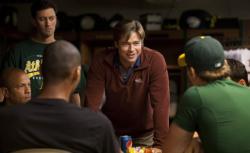Dear Dana, Stephanie, and Dan,
Hey. So what strikes me in these first few days of 2012, beyond the peculiar lack of snow here in Chicago, is how we’re still wrestling with films such as Melancholia and The Tree of Life. It’s because they’re films made by filmmakers, not guns for hire or directors who don’t think cinematically. Directors who don’t think cinematically sadly account for most of the movies we see all year. Both Melancholia and The Tree of Life are pretty grand, one formally pristine and polished, the other the usual narratively inchoate Malick tone poem, the best stanzas of which really sing. The loose flaps and dead ends in The Tree of Life are comically obvious, and yet I found the tensions and interactions among the young brothers to be unlike anything I’ve seen before, even in Malick.
Maybe, Stephanie, my response to the film has something to do with my own concerns as a father watching out for my son, with the typical parental combination of too lax and too stringent oversight. But my own childhood couldn’t have had less in common, presumably, with Malick’s. I do think the film is beautiful, but beauty alone, as we learn in other spheres of our lives, generally doesn’t cut it over the long haul, or even two hours of cinema.
Dana, my first report out of Cannes on Melancholia was a little hedgy; it’s not my favorite Von Trier, but I liked it even more a second time. I interviewed him a couple of days after that idiotic riff on Nazis and Jews and his own scrambled cultural heritage. Von Trier told me he was feeling not-great about Melancholia (which is sort of funny in itself), characterizing its immersion in German Romanticism as “too easy” and, after his more aggressive provocations, like “fighting with butter.” But even that description is a better image than you’ll find in most films.
In a previous industry life, the movies had only television to worry about for upstart competition; now, of course, it’s everything with a screen. All that competition is making the tent-pole blockbusters stink a little more, I fear. The Smell of Fear—wasn’t that a Naked Gun sequel title? When I think of franchise pictures like Pirates of the Caribbean 4: On Stranger Tides (lovely, honest title, actually) or Sherlock Holmes: A Game of Shadows, I think of a public that turns out, dutifully, out of brand loyalty, even suspecting the films are going to be pretty bad. And they’re worse than bad, particularly Guy Ritchie’s, because they’re brazen about not trying. They deliver mediocre, frenzied action in a way that recalls that line Brando says in Apocalypse Now: They’re just errand boys, sent by grocery clerks, to collect a bill, or in this case to deliver day-old white bread. Movies like Pirates 4 or Sherlock 2 never got any of the story issues right in the writing stage and their directors are lunkheads when it comes to pacing a violent action sequence. So it’s clumsiness on top of clumsiness, saved, I suppose, by global release strategies and marketing.
If 2011 had more middleweight triumphs on the order of Rise of the Planet of the Apes and 50/50 and Bridesmaids, movies that had commercial hooks aplenty but with some wit and punch, then it’d be easier to overlook the films on which the studios pin all their first, second, third, or fourth quarter hopes. I do love it when a really expensive picture like Ratatouille or Up comes along and renews my faith in the marriage of commerce and popular art. I love it even though the same studio, which is not made up of gods and goddesses but men and women with mortgages, turns out Cars 2, which my son was watching on the plane the other day over the holidays, and on second viewing really becomes even worse, just a blur of jaded, misjudged noise. Noise, plus toys.
No wonder those who manage to find it embrace a film such as Poetry, Lee Chang-dong’s exquisite character study, which is solid as granite in its sense of story. That was my favorite last year. I don’t know anyone who saw it and thought, Yeah, it’s OK. I suppose those people are out there, but when you see a picture that good, or as good as the Iranian film A Separation, which I have yet to write about, it makes up for a lot. The visual texture of Poetry isn’t ostentatious or even the reason it’s so wonderful, but the rhythms and delicate observations and humane unsentimentality of the whole are just unerring. And patient. And fascinating.
It’s a small film, but so was my favorite from another recent movie year, Bennett Miller’s Capote. His Moneyball is terrific, too, and with these first two narrative features we have an American director of remarkable subtlety and grace, pulling the best, most glancing work we’ve ever seen from actors as diverse as Brad Pitt, Jonah Hill, and Philip Seymour Hoffman. I’ll take one of Miller’s sequences in either picture over the fastidiously cool, self-consciously preening Drive any day. Different planets, clearly, but there it is. I did enjoy the first third or so of Drive, but on the whole I prefer Fast and Furious 5, which I saw at a wee French multiplex the same day as Drive first screened in competition at Cannes. It was a spiritual cleansing exercise, seeing both in the same day. I’m intrigued to the point of bafflement as to what the ardent lovers of Drive see in its “ravishing” surfaces and superhumanly cool antihero with the cool jacket and shades, sported by the unblinking god Ryan Gosling. The movie’s certainly pretty, and it was good to see Albert Brooks playing a murderous bastard. But I prefer my genre kicks with a little less hooey. Now if you’ll excuse me, I’m recording a Blu-ray commentary for The Cannonball Run. Dan?
